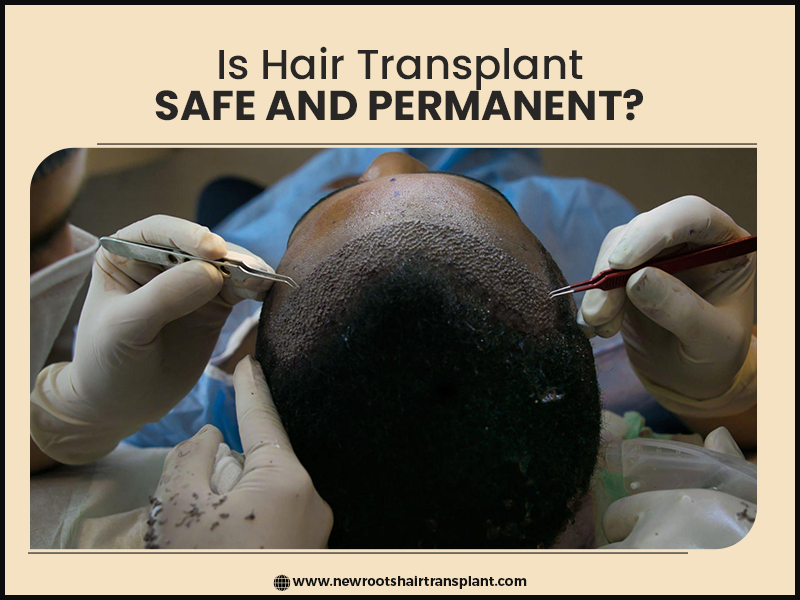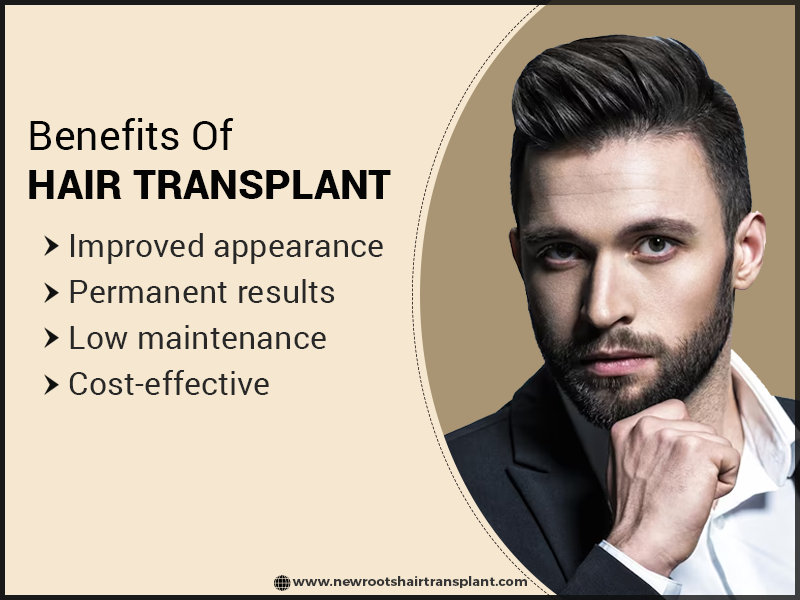
Hair loss affects millions of people around the world, and for some, it can be a significant source of anxiety and stress.
Hair transplant is one of the most popular solutions for hair loss, but many people are concerned about its safety and effectiveness.
In this guide, we'll answer the question "Is hair transplant safe and permanent?" and provide you with all the information you need to make an informed decision.
Before we dive into the safety of hair transplants, let's first understand what it is.
A hair transplant is a surgical procedure that involves removing hair from a donor site (usually the back of the head) and transplanting it to the bald or thinning areas of the scalp. Consequently, the new hair on your scalp is old hair in a new place.

Hair transplant is a fairly permanent procedure that has been fine-tuned and brought to perfection by surgeons over time.
The first ever hair transplant happened in 1939 in Japan, and now in 2023 hair transplant clinics have top-notch, state-of-the-art equipment that treats thousands of people.
One of the most common concerns about hair transplant is safety.
Like any surgical procedure, there are risks involved, but when performed by a qualified and experienced surgeon, hair transplant is generally safe.
Here are some safety factors to consider :
Choosing the right surgeon: Make sure to choose a qualified and experienced hair transplant surgeon who has a good track record of successful procedures.
Pre-op testing: Your surgeon should conduct a thorough evaluation of your medical history and perform necessary tests to ensure you're a suitable candidate for the procedure.
Post-op care: Follow your surgeon's post-op care instructions carefully to minimize the risk of infection and promote healing.
Also, the hair transplant is permanent because the transplanted hair follicles are resistant to the hormone that causes hair loss (DHT), which means they will continue to grow for the rest of your life.
Read More : Best Hair Transplant Clinic in Mumbai

There are several benefits to hair transplant, including:
Improved appearance: Hair transplant can restore a full head of hair, which can improve your appearance and boost your confidence.
Permanent results: As we mentioned earlier, hair transplant provides permanent results.
Low maintenance: Once the transplanted hair has grown in, it requires no special maintenance other than regular hair care.
Cost-effective: While hair transplant can be expensive upfront, it's a cost-effective solution in the long run because it provides permanent results.
While hair transplant is generally safe, there are still risks involved, including:
Infection: There is a risk of infection after the procedure, but this can be minimized by following your surgeon's post-op care instructions.
Bleeding: Some bleeding is normal after the procedure, but excessive bleeding can be a sign of a problem.
Scarring: FUT can result in a visible scar where the strip of scalp was removed, but this can be minimized by choosing an experienced surgeon.
Read More : BENEFITS OF PRP AFTER HAIR TRANSPLANT
Hair transplant is not suitable for everyone. Here are some factors that determine whether you're a good candidate:
Sufficient donor hair: You need to have enough healthy hair in the donor area for transplantation.
Age: Hair transplant is generally not recommended for people under 25 because it's difficult to predict the pattern and future extent of hair loss at a young age.
Overall health: You need to be in good health to undergo the procedure and heal properly.
Expectations: It's important to have realistic expectations for the procedure and understand that it may take several months to see results.
Hair loss cause: Hair transplant is typically recommended for those with genetic hair loss, but may not be effective for those with hair loss due to other factors, such as medical conditions or medications.
It's important to consult with our surgeons to determine if hair transplant is a good option for you.
They will evaluate your hair loss pattern, health, and expectations to determine the best course of action.
Keep in mind that hair transplant is not a quick fix and requires patience and commitment to achieve the desired results.
If you're considering a hair transplant, there are several things you can do to prepare for the procedure:
Quit smoking: Smoking can slow down the healing process and increase the risk of complications, so it's important to quit smoking before the procedure.
Avoid alcohol: Alcohol can thin the blood and increase the risk of bleeding, so it's best to avoid it for a few days before the procedure.
Avoid certain medications: Certain medications, such as blood thinners, can increase the risk of bleeding, so it's important to discuss all medications with your surgeon before the procedure.
The hair transplant procedure typically takes several hours and is performed under local anesthesia.
Here's what you can expect:
The surgeon will dress the area and provide you with post-op care instructions.
After the procedure, you can expect some swelling and redness in the recipient area, which will subside within a few days.
Here are some post-op care instructions:
Read More : HOW EFFECTIVE IS FUE HAIR TRANSPLANT IN INDIA
The procedure itself is not painful because it's performed under local anesthesia. However, you may experience some discomfort and soreness after the procedure.
It can take several months for the transplanted hair to start growing, but you should see noticeable results within 6-12 months.
Hair transplant should not cause hair loss, but some shedding of the transplanted hair is normal in the first few weeks after the procedure.
Yes, you can have a second hair transplant if you have sufficient donor hair.
Hair transplant is a safe and permanent solution for hair loss, but like any surgical procedure, it does come with some risks.
It's important to choose a qualified and experienced surgeon and follow all post-op care instructions to minimize the risks.
If you're considering a hair transplant, make sure to discuss all your options with your surgeon and ask any questions you may have.